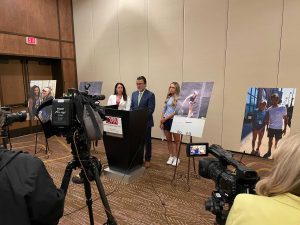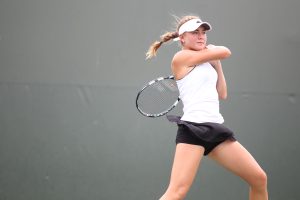- Slug: Sports-Tennis Assault Lawsuit, 797 words.
- 1 photo available.
By Kevin Redfern
Cronkite News
TEMPE – Phoenix-born tennis prodigy Kylie McKenzie, 23, announced in a press conference Tuesday afternoon that she is suing the United States Tennis Association for failing to protect her from a “known sexual abuser” in her former coach, Anibal Aranda.
McKenzie, a former United States top 10-ranked amateur, was joined by attorney Robert Allard and victim advocate Jancy Thompson, a sexual assault survivor from her time as a swimmer at Arizona State.
“I am here because I do not want anyone to experience what I have (experienced),” McKenzie said. “I hope that by speaking out, other young girls or women are not silenced or afraid to speak up.”
McKenzie alleges that Aranda made advances on her and eventually groped her in 2018 while acting as her swing coach, leading to years of physical and mental damage that she claims has prevented her from advancing her tennis career.
“I grew up within the USTA system, and I trusted them,” she said. “I was hoping they would take this more seriously, but I was wrong.”
The lawsuit comes in the wake of a $380 million settlement USA Gymnastics and the U.S. Olympic & Paralympic Committee reached with survivors of sexual abuse by former USA Gymnastics team doctor Larry Nassar in 2021.
McKenzie, born and raised in Phoenix and now lives in Arizona, was put on the fast track to tennis stardom when her parents decided to home school her in fourth grade to focus on her athletic development.
Within a few years, USTA coaches took notice of McKenzie’s dominant performances at local and national tennis tournaments and recommended that she train full time with the organization.
She moved in with another family in Carson, California, at 12 to train at a USTA development academy there, and later moved on to Orlando, Florida, living apart from her parents and siblings other than during a brief return to Phoenix in 2014.
It was in Orlando when she was 18 that McKenzie began taking lessons from Aranda. She alleges that he later sexually assaulted her during a private session at the USTA’s training facilities.
She immediately reported the incident to the USTA and said that she was instructed not to tell anyone about the alleged assault, to lie and if anyone inquired about her recent absences, to say that she was sick.
The organization did, however, suspend Aranda indefinitely while revoking his facility access.
Hearing about the incident, the U.S. Center for SafeSport, which investigates claims of sexual abuse in amateur Olympic sports, began looking into the report.
SafeSport’s findings are confidential, but in a copy obtained by the New York Times, an unnamed USTA employee testified that Aranda had assaulted her at a bar years earlier but she did not report the incident at the time. According to the Times report, the employee disclosed the assault to SafeSport’s investigators when she learned of McKenzie’s allegation.
The copy says the executive and USTA knowingly allowed for Aranda to continue one-on-one sessions with young girls, and Allard confirmed as much on Tuesday.
According to Allard, the USTA official had “executive” status, and officers in that role are “obligated” to report individuals who interact with children on a daily basis.
“For reasons that are presently unknown, this critical aspect of Aranda’s history was concealed,” Allard said, adding, “The reason (USTA was) in the dark is because they chose to be.”
The UTSA did not immediate respond to a request for comment. A USTA spokesperson told the Times the organization does not comment on pending litigation. The suit, which seeks compensatory damages, punitive damages and attorney’s fees, was filed in a U.S. District Court in Orlando.
SafeSport found that McKenzie’s claims were more likely to have been true than not, and instituted a two-year ban on Aranda from coaching tennis, while adding an additional two years of probation.
“This particular coach, and coaches in the past, have molested or sexually assaulted not just one, but multiple victims,” Thompson said. “So a two-year ban, in my opinion, is not long enough.”
Police also said they did not find enough evidence to prosecute Aranda based on the initial complaint.
While Allard believes Aranda may have fled to his home country of Paraguay amid the publicity, Allard will meet with his legal team, and he plans to offer the Orlando Police Department findings from the Safesport investigation. The hope is to propel a new criminal investigation into Aranda.
McKenzie said she plans to be back competing in the summer. Where does she see her career going from now? She said maybe at the collegiate level, but the endgame is much larger than school.
“My ultimate goal is to compete in Grand Slams and other events around the world,” she said. “I know that I am still capable of playing at a very high level and have the same promise I did as a young teen.”
For more stories from Cronkite News, visit cronkitenews.azpbs.org.


